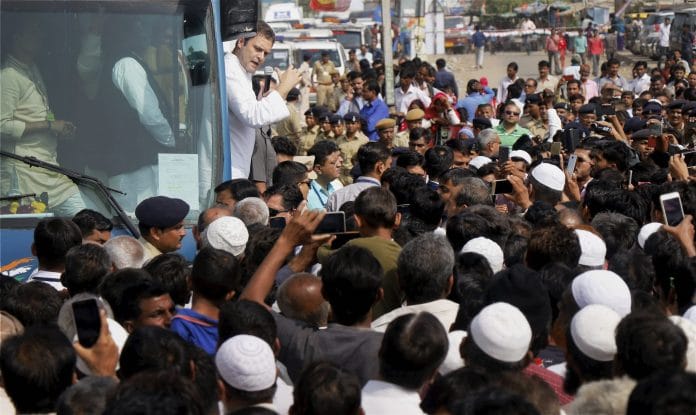Over 12 lakh new and first-time voters will be eligible to vote in the Gujarat elections next month, says the Election Commission of India. At a time when the parties are pitched in a heated battle over the claims of development, demand for job quotas and caste identity, many experts say youth voters are already shifting the tone of the campaign rhetoric, and may even influence the outcome. Many first-time voters were infants when the 2002 riots took place, and may be unencumbered by the politics around it.
What do first-time voters in Gujarat, who have no memory of 2002, expect from the elections?
What do the first-time voters expect from this election? Particularly when they have no personal memory as such of 2002, the year that is permanently marked in political and social history of Gujarat. This is a very good question to speculate on qualitative feedback and personal intellect. But that would be purely subjective.
The objective way to answer this question would be just quoting raw data from our tracker, which has been interviewing voters in the state on a weekly basis over the last so many years. So, I requested the CVoter Data team to simply pull out the ‘first-time voter’ respondents that it has interviewed in the last 12 months. These respondents were less than 18 years of age when the 2012 elections happened.
Apart from the generic issue of corruption that about 19 per cent of first-time voters (FTV) quote as the top-of-the-mind issue, it is actually the issue of “unemployment” that is taking center-stage with 17 per cent of FTV. About 16 per cent said that inadequate family income is bothering them. And about 15 per cent were extremely concerned about inflation or the rising cost of living. The issue of development bothers only about 5 per cent, followed by terror attacks at about 3 per cent. The much-talked about issue of ‘communal tension’ actually appears at the rock bottom, along with other less important issues, at just 0.9 per cent. Yes, communal tension is not an issue for even one per cent of the first-time voters of Gujarat.
Here are other sharp perspectives on the Gujarat Elections:
Mahipal Gadhvi: Gujarat state NSUI president
Sanjay Kumar: professor and director at CSDS
Naresh Desai: state secretary, ABVP, Gujarat
Vishnu Pandya: political analyst and Padmashree awardee
To put things in the correct perspective, these numbers remain in the same direction even for the Muslim FTV of Gujarat. Unemployment and inflation remain their top worries at about 20 per cent each. And the extremely sensitive issue of communal tension is named by, hold your breath, just 0.7 per cent of minority FTVs — even less than Hindu FTVs. We can’t say it is a non-issue, but certainly in today’s Gujarat, there are more important things in the lives of FTVs to bother about than getting stuck in the black history of 2002.
About 21 per cent of them say they are “extremely dissatisfied” with the state government. This number of angry FTVs goes up to 25 per cent when asked about the sitting chief minister, and shoots up to about 40 per cent when asked about the sitting MLAs in their areas.
But the moment you ask about the central leadership, the numbers just change in the opposite direction. On a straightforward question of their preferred leader between Narendra Modi and Rahul Gandhi, it becomes one-way traffic, with almost 60 per cent opting for Modi. Approximately 28 per cent say Rahul Gandhi, while the rest remain mum on this issue.
Every 10th FTV says that the country might be moving ahead but not their life, another 16 per cent complain both are in poor state. This means, every fourth FTV is complaining that almost everything is wrong. But compare this number to 60 per cent of the FTV who say that things, in general, are moving in the right direction, for the country as well as for their personal lives.
Indeed, the index of optimism is at a high of 52 per cent when asked if they feel their quality of life will get better over the next one year, when compared to only 15 per cent who sound completely pessimistic.
That settles the case I guess. But glass-half-full or glass-half-empty is a question of context and perception.
Yashwant Deshmukh is the founder-director, CVoter International







What is so surprising about communal tension not an issue in FTV, as there has been none after 2002, it’s media or opposition which has kept it alive till date. Again Development is also not much of an issue as Gujrat is already quite an advance state, so other issues take centre stage.